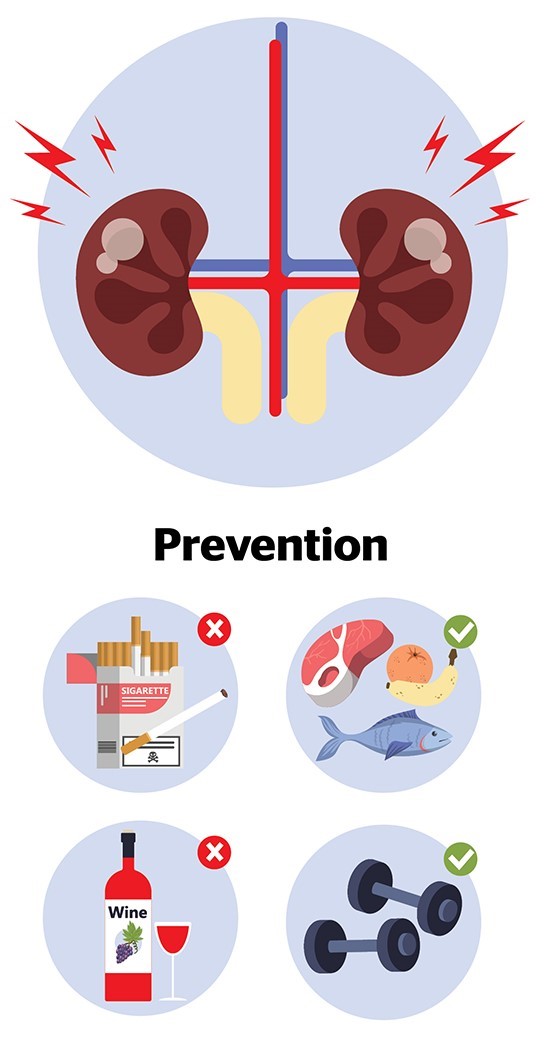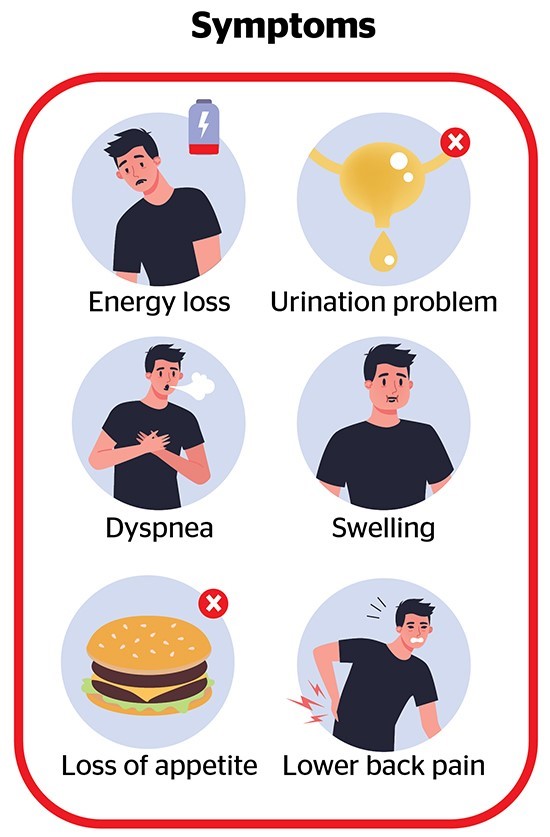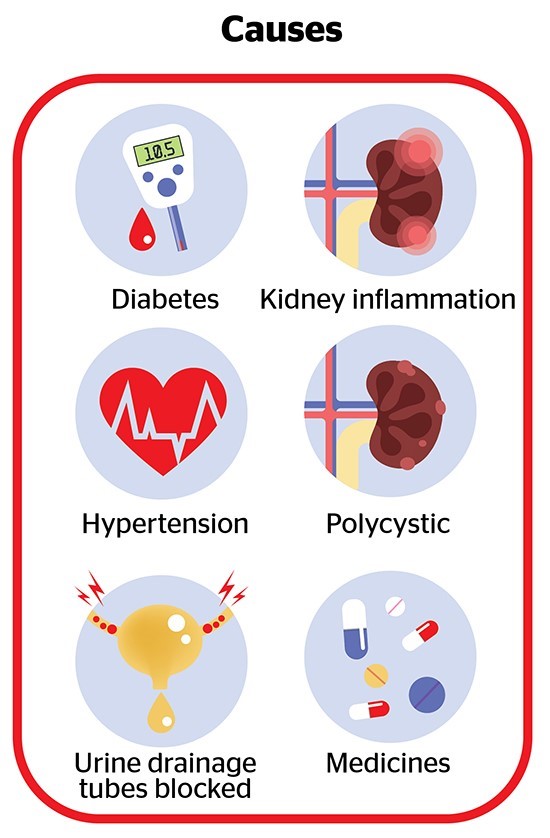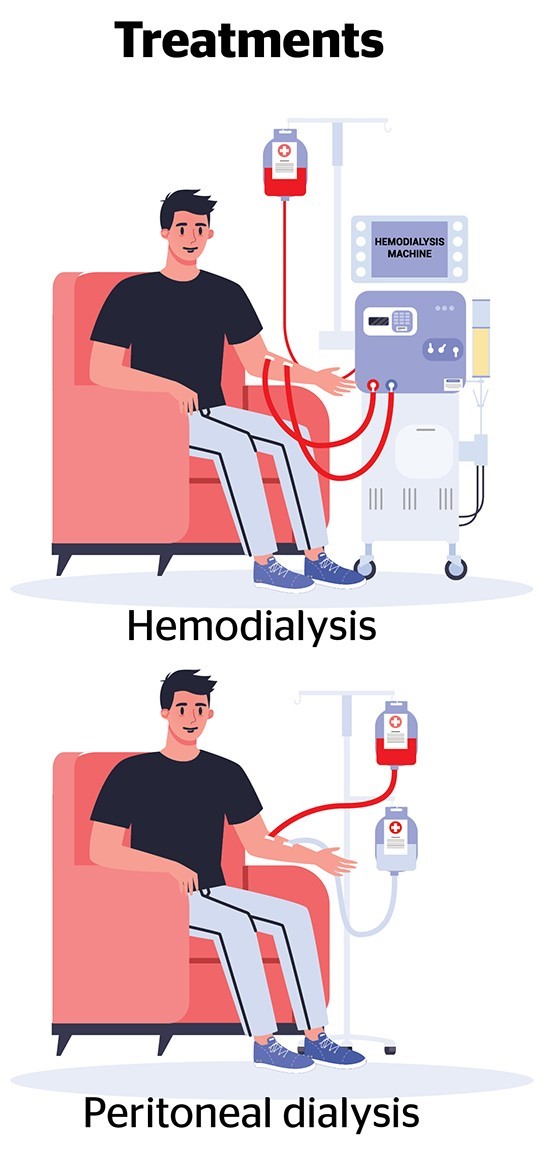The term “non-communicable diseases”
(
NCDs) refers to a group of diseases that cannot be transmitted. The most
common NCDs are hypertension (high blood pressure), diabetes, and cancer. NCDs
are known as the most common cause of death worldwide, with diabetes estimated
to directly cause 1.5 million deaths per year and hypertension responsible for
around 12.8 percent of total deaths globally.
اضافة اعلان
In Jordan, the most
common cause of death is cardiovascular-related complications, including
hypertension, which causes 39.1 percent of deaths. Similarly, the fourth most
common cause of death in the Kingdom is diabetes, at 8.1 percent of deaths.
However, Jordan also faces another NCD that poses major concerns within the
medical field:
chronic kidney disease (CKD).
 What is CKD?
What is CKD?
The
kidneys are an often-overlooked organ of the body. They play many
essential roles, including maintaining salt levels in the body, assisting in
producing red blood cells, maintaining blood pH, and secreting waste from the
body. When the kidneys become impaired, they can no longer perform these vital
actions, leading to negative impacts on health and overall quality of life.
The disease of
greatest concern to this life-sustaining organ is CKD, which causes progressive
and irreversible kidney damage. CKD has many causes, but hypertension and
diabetes are the most common. It is estimated that CKD affects 13.4 percent of
the global population.
The kidneys are
composed of roughly one million small filters, known as nephrons. These
nephrons are largely responsible for dictating the quantity of salts, wastes,
and water the body saves or eliminates. Each nephron requires a network of
healthy blood vessels to perform this function.

In cases of
hypertension, high blood pressure causes these blood vessels to narrow, weaken,
or harden. Similarly, nephropathy (deterioration of the kidneys) is a common
complication of diabetes that leads to CKD, with estimates showing that one in
three people with diabetes have CKD.
CKD is incurable
and progressive, so as time goes on, the level of function will decrease,
ultimately reaching a point at which kidney function is minimal or ceases
completely. Such cases are termed end-stage renal disease (ESRD) or renal
failure.
At this stage,
there are only two treatment options. The first and most widely employed
management option is dialysis. When it comes to ESRD, the chief concern is the
buildup of waste. Dialysis helps overcome this issue by externally filtering or
eliminating waste. The most common form of dialysis is hemodialysis, in which
blood is pulled from the patient into a machine that filters out the waste and
then pumps the cleaned blood back into the body. This is a practical but
intensive solution.
Since CKD involves
irreversible damage, patients will have to continue hemodialysis for the rest
of their lives, typically visiting a hemodialysis unit three times a week for
three or four hours per visit.
CKD is incurable and progressive, so as time goes on, the level of function will decrease, ultimately reaching a point at which kidney function is minimal or ceases completely. Such cases are termed end-stage renal disease or renal failure.
Given the intensive
nature of dialysis, a kidney transplant is generally considered a better
solution. However, this option lacks practicality. The demand for kidneys is
much higher than the supply. Additionally, a transplant requires immunological
compatibility between the donor and the recipient, and the donation process
involves general eligibility requirements. Many factors, such as age and
underlying conditions, can make a patient ineligible for receiving a
transplant.
Chronic kidney disease in Jordan
Jordan was an early pioneer of CKD treatment and management in the Middle
East. It was the first nation in the region to perform a kidney transplant on
May 18, 1972. It was also the first to perform a kidney transplant in a public
hospital in October 2009.

In 1981, Jordan
University Hospital set up the Kingdom’s first dialysis unit, which is still in
operation. As the rate of ESRD has increased, so too has the demand for
dialysis units across the nation, and as of 2019, 87 units were in operation.
However, Jordan has
limited data on CKD. Currently, the Kingdom only has a registry for patients
with ESRD, the National Registry of End Stage Renal Disease, which the Ministry
of Health maintains. The ministry created this registry in response to the
growing problem of CKD and ESRD to monitor and collect data. Although the
registry is meant to be updated annually, the latest report is from 2019.
According to the registry, 6,316 patients were receiving dialysis to treat ESRD
as of 2019. Most of these patients were in their 60s, with a six percent
mortality rate for that year.
Concerns are
mounting that CKD is not being recognized in its early stages. Catching CKD
early is important to management. Although the progression into worse stages
cannot be stopped, it can certainly be slowed. A 2017 study conducted in Jordan
investigated these concerns, gathering participants at risk for CKD but not
diagnosed. The study found that 31 percent of participants had undiagnosed CKD,
and 0.7 percent had ESRD.
Managing CKD
Managing CKD on a large scale requires governmental assistance. In Jordan,
the Ministry of Health should resume maintaining the ESRD National Registry and
consider expanding it to include all CKD patients. This would require screening
measures for CKD among Jordanians (especially those at risk) to be implemented.
Campaigns should also be launched to spread awareness on this rising issue.

That said, there is
only so much the government can do, and some level of personal accountability
is required. The best and most effective way to manage the CKD crisis is by
preventing it. The overwhelming majority of ESRD patients in Jordan also have
hypertension (52.9 percent) and/or diabetes (45.5 percent). Although these two
conditions inherently place individuals at a higher risk for CKD, controlling
blood pressure and blood sugar levels can reduce the risk.
Individuals can
also reduce their risk of CKD by performing a minimum of 150 minutes of moderate-intensity
exercise per week and consuming well-balanced meals that consist of whole
foods, within the range of their caloric needs. By following these steps and
caring for their general health, individuals can prevent many risk factors that
lead to CKD, while helping to manage other conditions.
Finally, individuals need to ask their doctors about CKD
screening if they have concerns about being at risk. Currently, there are no
general recommendations on screening for CKD, even for those with high-risk levels.
However, for those with diabetes, the American Diabetes Association recommends
that CKD screening begins at the time of diabetes diagnosis, with annual
checks. This places the burden on the individual to seek out screening. If you
have hypertension, diabetes, a family history of ESRD, or are older than 65,
consider speaking to your doctor about screening for CKD.
Read more Health
Jordan News



